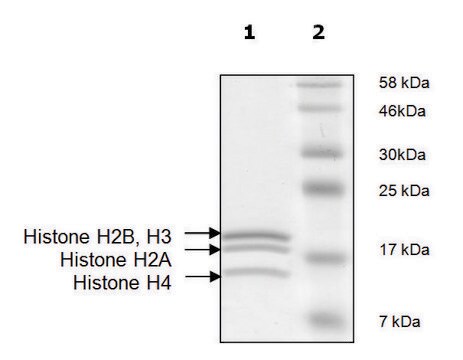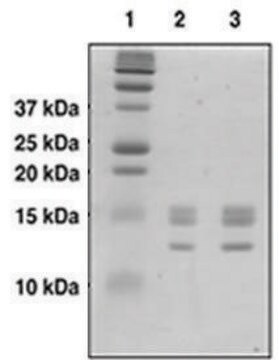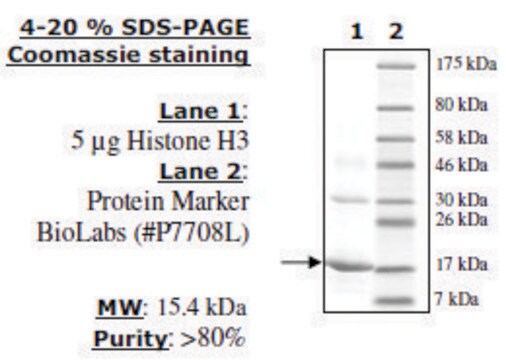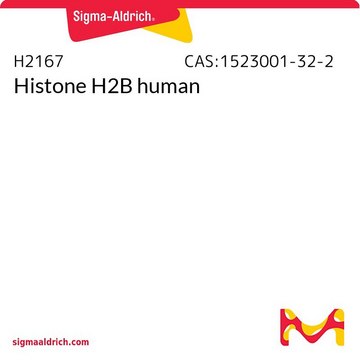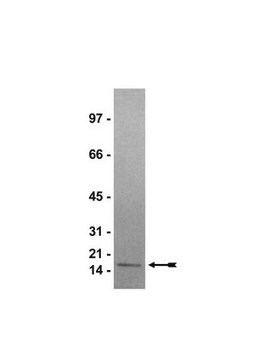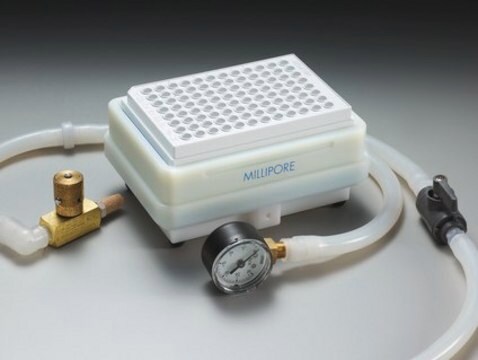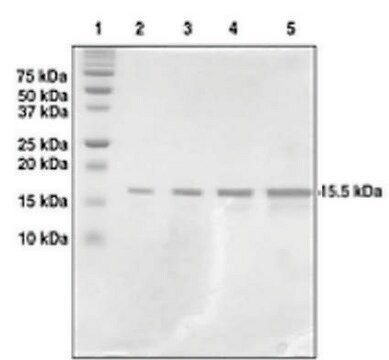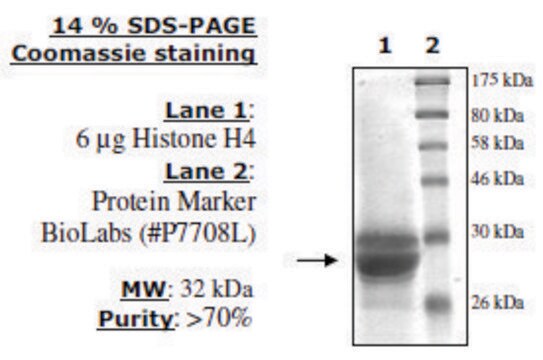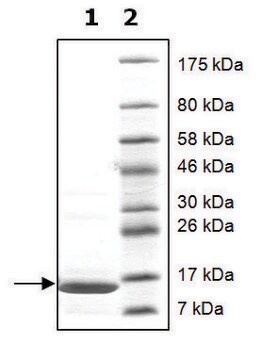13-107
Core Histones
Highly pure core histones proteins (H2A, H2B, H3 and H4) including H1 purified from chicken erythrocytes, suitable as a substrate for histone modification assays (HAT, HDAC, DNMT) and nucleosome assembly studies.
Synonym(s):
Core Histone Proteins
Sign Into View Organizational & Contract Pricing
All Photos(1)
About This Item
UNSPSC Code:
12352200
eCl@ss:
32160405
NACRES:
NA.32
Recommended Products
biological source
chicken
manufacturer/tradename
Upstate®
technique(s)
activity assay: suitable (histone acetyltransferase (HAT))
shipped in
dry ice
General description
Histones are a family of basic proteins that associate with DNA in the nucleus and help condense it into chromatin. Some histones function as spools for the thread-like DNA to wrap around forming a nucleosome. Each nucleosome is made of DNA wrapped around eight histone proteins that function like a spool and are called a histone octamer. Each histone octamer is composed of two copies each of the histone proteins H2A, H2B, H3, and H4. The chain of nucleosomes is then wrapped into a 30 nm spiral called a solenoid, where additional H1 histone proteins are associated with each nucleosome to maintain the chromosome structure.
Application
Core histones and histone H1, purified from chicken erythrocytes; suitable as a substrate for HAT assays; purity = 90%
Quality
rountinely evaluated by immunoblot using Anti-Histone H3 (05-499) and Anti-Histone H4 (07-108)
Physical form
Lyophilized
Storage and Stability
Lyophilized: 2 years at -20°C; Rehydrated: 6 months at -70°C
Legal Information
UPSTATE is a registered trademark of Merck KGaA, Darmstadt, Germany
Disclaimer
Unless otherwise stated in our catalog or other company documentation accompanying the product(s), our products are intended for research use only and are not to be used for any other purpose, which includes but is not limited to, unauthorized commercial uses, in vitro diagnostic uses, ex vivo or in vivo therapeutic uses or any type of consumption or application to humans or animals.
Storage Class Code
11 - Combustible Solids
WGK
WGK 2
Flash Point(F)
Not applicable
Flash Point(C)
Not applicable
Certificates of Analysis (COA)
Search for Certificates of Analysis (COA) by entering the products Lot/Batch Number. Lot and Batch Numbers can be found on a product’s label following the words ‘Lot’ or ‘Batch’.
Already Own This Product?
Find documentation for the products that you have recently purchased in the Document Library.
Customers Also Viewed
AtFKBP53 is a histone chaperone required for repression of ribosomal RNA gene expression in Arabidopsis.
Hong Li,Sheng Luan
Cell research null
1-Aminoindan-1,5-dicarboxylic acid and (S)-(+)-2-(3'-carboxybicyclo[1.1.1] pentyl)-glycine, two mGlu1 receptor-preferring antagonists, reduce neuronal death in in vitro and in vivo models of cerebral ischaemia.
D E Pellegrini-Giampietro,A Cozzi,F Peruginelli,P Leonardi,E Meli,R Pellicciari,F Moroni
The European Journal of Neuroscience null
Analysis of nuclear receptor acetylation.
Chenguang Wang,Michael Powell,Lifeng Tian,Richard G Pestell
Methods in Molecular Biology null
Human erythropoietin-specific sites of monoclonal antibody-mediated neutralization.
M R Fibi,M Aslan,P Hintz-Obertreis,J U Pauly,M Gerken,G Luben,L Lauffer,B Siebold,W Stuber,G Nau
Blood null
Christina Schellenbacher et al.
Journal of virology, 83(19), 10085-10095 (2009-07-31)
The amino (N) terminus of the human papillomavirus (HPV) minor capsid protein L2 can induce low-titer, cross-neutralizing antibodies. The aim of this study was to improve immunogenicity of L2 peptides by surface display on highly ordered, self-assembled virus-like particles (VLP)
Our team of scientists has experience in all areas of research including Life Science, Material Science, Chemical Synthesis, Chromatography, Analytical and many others.
Contact Technical Service